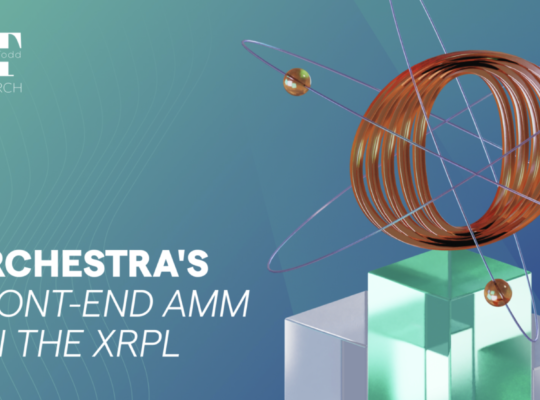RippleX and Zoniqx recently announced their partnership that will help bring Zoniqx’s asset tokenization infrastructure to the blockchain to the XRP Ledger.
This is significant given Ripple’s institutional foothold, and Zoniqx has already issued over $5 billion worth of assets on the blockchain. For context, Franklin Templeton, the leading issuer of tokenized Treasury Bills, has only issued $325M worth of them.
This partnership will provide extensive infrastructure for a variety of tokenization use cases and streamline the issuance of new assets on the XRP Ledger. This will all be done while ensuring full legal compliance, which will in turn reduce potential barriers for institutions or other parties interested in tokenizing assets.
Below I’ll provide an overview of Zoniqx, including:
- Their main products
- Areas of focus
- Background on the team and project
Tokenization on the XRP Ledger
Asset tokenization represents real-world assets on the blockchain and confers several benefits:
- Fractionalization
- Global accessibility
- Increased security
- Efficient transactions
For example, on-chain gold could be purchased in any quantity, with global liquidity, no risk of physical theft, and settlement within seconds. Boston Consulting Group (BCG) estimated that the total value of tokenized assets will reach $16T by 2030.
Many balance-sheet-heavy institutions are already partnered with Ripple for payment solutions and stand to benefit from tokenizing their existing assets.
That being said, it can be challenging for institutions to do so themselves. For instance, ensuring compliance with local regulations can impose significant legal costs alone. Furthermore, actual token issuance, the creation of secondary markets, adding flexible features, and so on can be extremely challenging.
This leads to a necessity for projects like Zoniqx that provide the necessary tokenization infrastructure.
Zoniqx
Zoniqx, formerly known as Tassets, began in 2017 and is led by Prasanth Kalangi: Founder & CEO and Sanjeev Birari (Co-Founder & CBO)..
They provide plug-and-play infrastructure for asset tokenization across numerous blockchains, with Tokenized Asset Lifecycle Management (TALM) being their overarching framework.
TALM handles everything, ranging from primary token issuance to secondary market management, for a variety of digital assets and security tokens. This includes tokenized equity, debt funds, private capital funds, real estate, supply-chain invoices, non-performing assets, and more.
The various components and products of TALM include:
- Tokenization Platform as a Service (TPaaS): A white-labeled product focused on primary token issuance, with features such as smart contract integrations, dynamic cap table management, and asset marketplace creation.
- SecureConnect: An interoperability solution for token distribution that connects to DEXs, institutions, private investors (e.g. hedge funds), broker-dealer networks, and more. For example, one could tokenize an asset and then have it distributed to both DEXs of choice and to other relevant parties as well.
- SecureTrade: Alternative Trading System (ATS) integrations, white-labeled DEX for STOs, liquidity management, built-in compliance (audits, KYC/AML, multisig, end-to-end encryption), and a UX interface. This suits nearly every use case that a tokenization platform could require. Enabling asset issuers to launch their own DEX for token trading, in compliance with regulatory standards.
- SecureFi: allowing token holders to use their assets as collateral for financing. It caters to both individuals or organizations seeking to leverage their tokenized assets and lenders comfortable with accepting these assets as collateral. This integration fosters secure and efficient transactions, streamlining financial exchanges in the DeFi ecosystem.
- EvoSmart: A smart contracts engine that can automate complex business logic and transactions.
- CompliTO: A compliance system focused on minimizing legal risks for both issuers and investors.
- SmartGPT: A generative AI engine, was successfully integrated into Zoniqx’s platform, revolutionizing Investor relations and document intelligence
They also have Dynamic Compliant Interoperable Security Tokens (DyCIST), a custom token standard that’s compliant and interoperable between various networks, including the XRP Ledger, Hedera, and Ethereum (ERC7518).
Areas of focus include real estate, private yachts, debt funds,
- Real estate: Fractionalization increases liquidity while blockchain technology enables global reach.
- Private yachts: Fractionalization expands ownership reach, regardless of geographical location.
- Debt funds & Private Equity funds: Blockchain-based funds increase fundraising efficiency, streamline processes, and provide transparency over asset management.
- Supply chain invoices: Accelerated financing, and reduced risk through smart contract enforcement.
Additional areas include private credit opportunities, sovereign debt funds, and venture capital funds. It’s also likely that the number of industries will expand alongside blockchain maturity and adoption.
The team mentioned that they have the most experience with real estate, having tokenized sectors including commercial, single-family homes, real estate debt, and equity.
Conclusion
Zoniqx represents a new tokenization infrastructure for the XRP Ledger which reduces associated friction in bringing further assets on-chain.
It also complements pre-existing Ripple partnerships, which tend to be parties that have a direct interest in tokenizing assets.
While tokenization is still in its early phases, the industry is moving fast and it makes sense that established firms that are focused on compliance and flexible infrastructure will make strong progress.
To learn more about Zoniqx, visit their website at https://www.zoniqx.com/ or follow them on Twitter at https://twitter.com/zoniqxinc.


